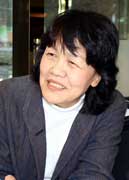Child TraffickingSupporting the well-being of children
 |
| Children begging on a Cambodian street in August 2003. Children from poor families are at risk of becoming targets of child traffickers. (Photo courtesy of Children without Borders) |
There are children today being bought and sold for money and then forced to work. The terrible reality of "child trafficking" exists in many parts of the world, including in Japan.
In our investigation of this issue, we found that children who are our peers are coerced into prostitution or child labor. They are deprived of their freedom and forbidden from going to school.
We also became aware of the "Convention on the Rights of the Child," which was enacted to protect the children of the world. How can we help put a stop to child trafficking, which robs children of their well-being, a child's right?
Being informed of the true situation, seeing this as a problem close to us, and taking action--these are the steps we offer to address the problem.
|
Director of Japan International Center for the Rights of the Child (JICRC) Hiroko Fujii |
 |
| Hiroko Fujii says: "Please learn about the real conditions of children who are being deprived of their rights." (Photo taken by Ren Nonaka, 17) |
Forced into prostitution and begging
Hiroko Fujii, 63, is the director of the Japan International Center for the Rights of the Child (JICRC), located in Tokyo. JICRC helps support the child victims of trafficking in Cambodia. She told us, "We want to save as many children as possible and support them in starting a new life."
Children in Cambodian villages are at risk of being sold to cities inside and outside the country and forced into working as prostitutes or beggars. Girls who become prostitutes often come down with infectious diseases, like AIDS, or they are injected with drugs to prevent them from running away.
It is said that child trafficking is bred by poverty in the villages and the low position of women and children in society. In some cases children are deceived, believing they will be given a job at a factory; in other cases, children are sold in exchange for clearing the debt burdening their parents. Japan isn't blameless when it comes to child trafficking, either. There are Japanese men who visit Cambodia to take advantage of child prostitution.
Ms. Fujii stressed to us: "Please learn about the real conditions of children who are being deprived of their rights, consider the problem carefully, and take action to address the problem." (Shiori Ueki, 17, and Marina Ishimoto, 16)
|
"Children without Borders" |
 |
| A victim of child trafficking (left) is learning to become a hairdresser. (Photo courtesy of Children without Borders) |
The NPO "Children without Borders" provides support to victims of child trafficking and street children, helping them to lead lives on their own. They run the "Youth House" where about 50 boys and girls stay, ranging in age from 15 to 19.
At this facility the boys and girls are offered vocational training, such as making silk products or furniture and repairing motorbikes. The staff also provides psychological care and a basic education so the children can learn to read and write.
Ayako Otake, 42, worked there as a staff member for three years, starting in 2001. "Children who have suffered deep trauma can gain confidence in themselves through studying and receiving vocational training," she said. "It's important to provide them with support so they can become independent." (Daichi Ishii, 15)
|
Associate Professor of Faculty of International Studies, Meiji Gakuin University Yuriko Saito |
Low wages, obedient nature contribute to child trafficking
Poverty must be addressed, sound education is needed

We interviewed Yuriko Saito, an associate professor at Meiji Gakuin University and an expert in human trafficking. According to the United Nations Office on Drugs and Crime (UNODC), more than 214,000 people have been rescued from situations involving human trafficking in the world. Approximately 20% are under the age of 18.
In most cases, they are forced into prostitution; sometimes they become victims of organ theft or child labor. For example, in plants located in Thailand and Bangladesh which process seafood products, children are made to work long hours in cold rooms to keep the products fresh. They are allowed to go to the bathroom only a limited number of times during a work shift; if they go to the bathroom more times than this, they are punished with a fine.
Professor Saito points out that the lower wages paid to children, when compared with adults, as well as their more obedient nature contribute to child trafficking. The children are also at a loss when it comes to escaping their conditions, she adds.
The facts involving child trafficking in Japan aren't clear. However, Professor Saito heard the account of a 15 or 16-year-old girl from Thailand who was forced to work as a prostitute here. The girl was tricked into this predicament when she was told, "You have to pay back your debt," and then she was unable to flee. Another example involves a Japanese girl who ran away from home and was sold to a bar and forced into prostitution.
To prevent human trafficking, it is vital to address the problem of poverty and provide a sound education which teaches the importance of human rights. (Kanna Inoue, 16)
|
|
Subcommittee meeting considers story, ponders rights violations
 |
| Junior writers ponder the rights of children in connection with a true story about a girl who was the victim of trafficking. |
We took part in the subcommittee meeting "Asian children and the rights of the child," part of the "Forum for the Convention on the Rights of the Child" which was held in the city of Hiroshima on November 13. Ms. Fujii, the director of the Japan International Center for the Rights of the Child (JICRC) served as a speaker. In her presentation, Ms. Fujii shared a true story about a girl who fell prey to trafficking in Cambodia. In connection with this story, the participants exchanged views on the rights of a child to live a happy life.
Summary of the story
Mary, a pseudonym for a real girl, was born in a minority clan in a mountainous area of Cambodia. Abandoned by her parents, the man who was taking care of her sold her to an old man when she was 10 years old. Mary looked after the old man, but when he was displeased with her, he would whip her. When she was 14 or 15 years old, she was forced to marry a soldier who was 12 years older than her. But he went into battle and never returned. The old man then sold her to a brothel in the capital city of Phnom Penh.
The participants read the story and wrote down the problems raised by Mary's experience. Then they discussed the elements of the story that violate the "Convention on the Rights of the Child." With regard to her trafficking, this is a violation of Article 34, "To protect the child from all forms of sexual exploitation and sexual abuse" and Article 35, "To prevent the abduction of, the sale of or traffic in children."
Ms. Fujii said that her organization, in cooperation with a local NGO in Cambodia, is seeking to educate village leaders, teachers, and children about human rights. They are making efforts to change the awareness of society as a whole.
 |
| Junior writers give a presentation on children's rights. |
At the end, the participants shared their impressions, saying such things as, "I now see how blessed our lives are" and "I want to consider what I can do to help make a world where the rights of every person are respected." (Miyu Sakata, 15, and Yuji Iguchi, 14)
Opening event Junior writers report on coverage involving human rights
On November 12, the opening event for the "Forum for the Convention on the Rights of the Child" was held at Hiroshima Peace Memorial Museum. Children from five prefectures, including junior writers from Peace Seeds, took part in the event and gave presentations on their findings with regard to such things as the Convention and the problem of bullying.
The junior writers offered a report on an interview held with three human rights activists who attended the World Summit of Nobel Peace Laureates, which was held in Hiroshima in November 2010. We spoke about situations in the world which are violations of a child's rights, such as capital punishment for children, child soldiers, and child labor. We also shared the words of the secretary general of Amnesty International, Salil Shetty, who told us, "The power of youth can bring change," and we appealed to those in attendance to take action for children's rights. (Yumi Kimura, 15)
- Convention on the Rights of the Child A convention concerning the rights of the child, it was enacted in the United Nations General Assembly in 1989. A child is defined as someone under the age of 18 and this international agreement specifies provisions to protect their rights. A total of 193 countries, except for the United States and Somalia, have signed the convention. Japan ratified it in 1994.
 "Forum for the Convention on the Rights of the Child," held in Hiroshima
"Forum for the Convention on the Rights of the Child," held in Hiroshima